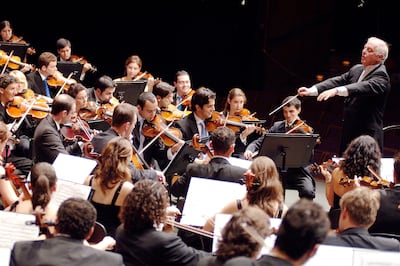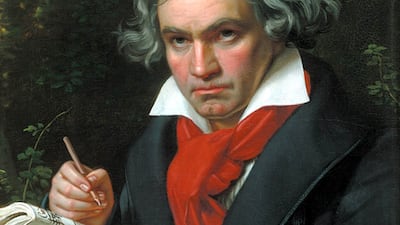When Ludwig van Beethoven began working on his Symphony No 9 a little more than two centuries ago, the renowned German composer knew his time was running out. An encroaching hearing loss and failing health, believed to have begun in his late twenties in about 1795, and which historians attributed to conditions ranging from Otosclerosis to an autoimmune disease, rendered him deaf as he attempted to deliver his final and grandest artistic statement of all.
Aware this could be his last major work, and in his zeal to deliver a parting message about life and humanity, Beethoven's revolutionary symphony broke conventions from the inclusion of a chorus and unprecedented 70-minute length to its structural innovation.
Those in the UAE will get to experience the power of Beethoven’s masterpiece on Sunday, when the Polish National Opera Orchestra performs Symphony No 9 at Dubai Opera, in tribute to the 200th year since its 1824 debut in Vienna. The evening’s conductor, Patrick Fournillier, tells The National how preparation for such a complex and emotionally fuelled assignment extended beyond rehearsals.
"There is that element of technicality that has to be perfect if we are going to successfully perform the symphony," he says. "But the work has a higher message because of its human and spiritual vision. So I spent a lot of time talking to the orchestra about Beethoven's life and what he was feeling when working on the symphony and the powerful message it can still deliver to audiences today."
In May, the world-renowned Argentine-born Israeli conductor Daniel Barenboim – who founded the West-Eastern Divan Orchestra with late Palestinian-American scholar Edward Said – wrote an essay in The New York Times, praising the work’s revolutionary nature.
“The greatness of music, and the ninth symphony, lies in the richness of its contrasts,” he wrote. “Music never just laughs or cries; it always laughs and cries at the same time. Creating unity out of contradictions – that is Beethoven for me.”

An example of that unexpected fusion in Symphony No 9 is Beethoven’s decision to incorporate a choir and vocal soloists in the final movement, something never done in a prior symphony. The move allowed Beethoven to use the choir to sing the humanist verses of the poem, Ode to Joy, by German playwright Friedrich Schiller.
Fournillier says Beethoven wanted the poem's key messages of universal brotherhood to amplify his message that humanity can only find peace through co-existence.
"At the time, the use of a chorus was only limited to opera and never for symphony," he says. "But Beethoven, perhaps because he knew this would be the last time he could deliver his message, disregarded that idea and knew that he needed a human voice to deliver this most personal of messages. By doing that he broke some of the conceptions surrounding what is considered an orchestra in that it is not only for musicians but for a chorus as well. In a way, he helped unify aspects of the classical music world."
Not surprisingly, Symphony No 9 became a turning point in classical musical history as more composers, from Gustav Mahler and Johannes Brahms, began experimenting with vocals in their symphonies. Hector Berlioz (Symphonie Fantastique,1830) and Franz Schubert (Symphony No 9 in C Major, 1862) were also inspired to release symphonies with conceptual and overarching themes.
While 19th-century composers Felix Mendelson and Robert Schumann were also influenced to infuse humanistic messages in their work as a result of the ninth symphony, Fournillier says they rarely matched the impact of Symphony No 9, which remains even more relevant today.
"We find ourselves today and all through history a need to keep giving messages to people and remind them about the importance of peace," he says. "We live in a world with lots of wars, troubles and people dying for ridiculous reasons and Beethoven wanted people, particularly those of power, to use their influence to build a better life for all humanity."
Beethoven died three years after the premiere of Symphony No 9. Today, the composition, the official anthem of the European Union, remains a clarion call for peace. Its message needs to be heard now more than ever.
Beethoven's Ninth Symphony performed by the National Polish Orchestra is staged Sunday at Dubai Opera. Showtime is 8pm; tickets from Dh260


